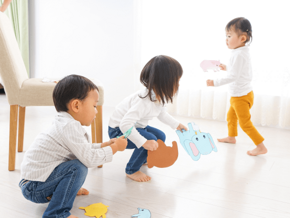
Your child is developing so fast! He is starting to discover his new world, thanks to your loving care and his rapidly awakening senses. This development happens in key stages, from his newly found curiosity in the first few months to his first words and steps from his 12th month.
Your child’s first “conversation” with you may be filled with gurgles and babbling, as he reacts to your sounds and facial expressions. But if you were to call out to him from another room, he’ll ignore you.
Your child watches your every expression and tone to connect with you in a conversation. When he’s happy, he’ll be very talkative and when he’s not, he’ll cry.
Help your little one develop his language skills. 'Do not expect to hear any real words just yet. Here’s what you can do right now to help your child talk and develop his language and social skills:
• Talk about what you are doing. If you’re putting socks on him, talk about that expressively. If you have a rattle in hand, wave the rattle around and talk about the rattle.
• Use short and simple words and sentences. Remember, your child can only process simple information at this stage.
• Use his name and nouns consistently. For example, ask, "Where is Aidan’s ball?" rather than, "Do you know where it is?”. He’s still too young to understand what pronouns like "you," "me," "yours," and so on mean. So, just say for example, "Ahmad did a good job."
• See and Touch. Talk about objects that they can see and touch simultaneously as it helps make a stronger connection.
• Get a picture book and photos. You child will love to look at faces and people at this stage. So, picture books make great conversation starters!
• Sound happy when you talk. Since most adults almost automatically switch to a sing-songy voice whenever they’re face-to-face with children, this should be rather easy to do.
• Use hand gestures and exaggerate your facial expressions as you speak. Even though you may feel silly, this will hold your child’s attention and help him understand you better. Be sure you use happy facial expressions. This way you’ll have your child talking happily.


























